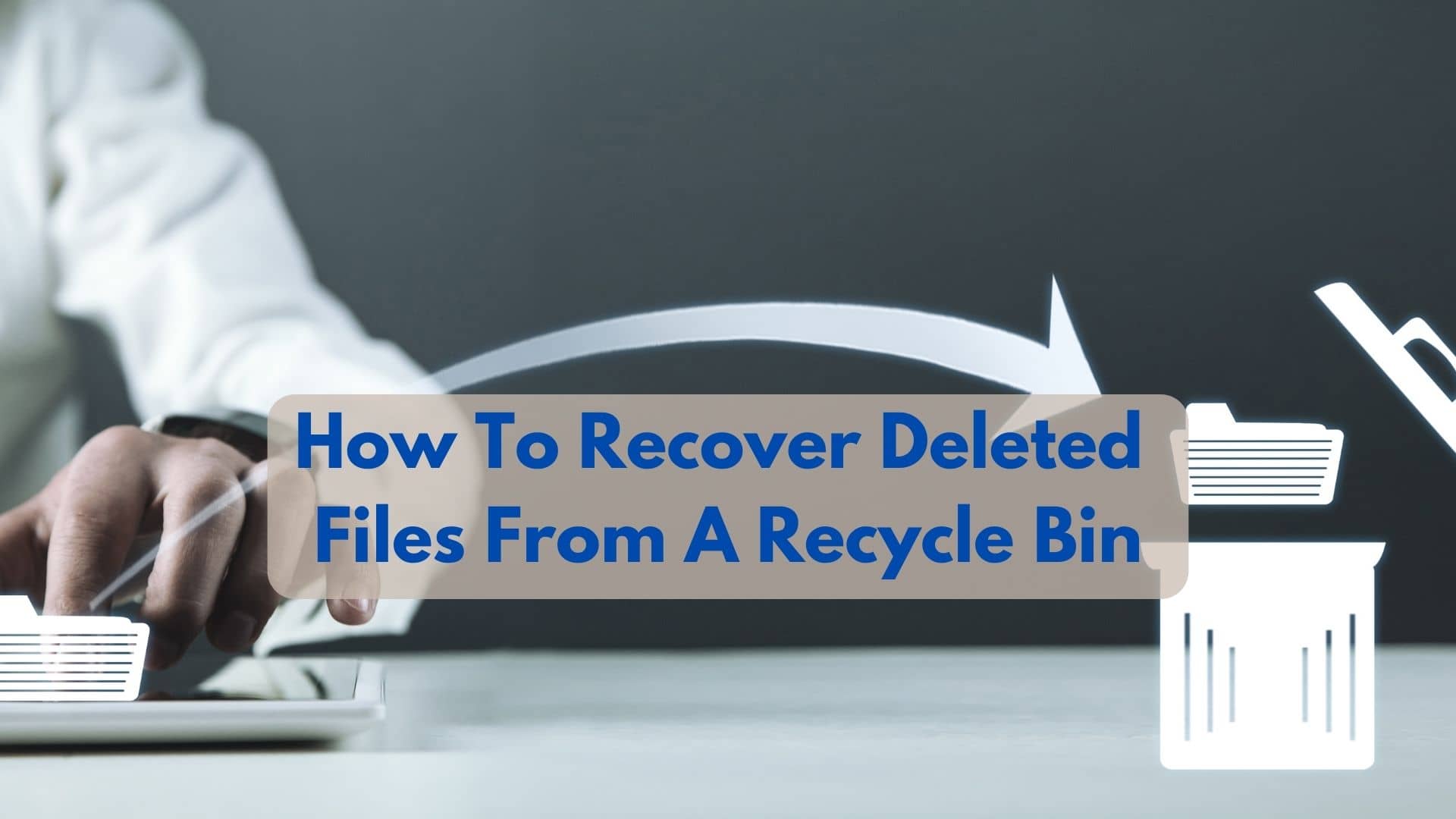Have you ever accidentally deleted an important file and realized it’s gone forever? Don’t fret, because in this article, we will show you how to recover deleted files from a recycle bin. Losing important files can be a frustrating experience, but with the right knowledge and tools, you can retrieve them and breathe a sigh of relief. Whether you’re a computer novice or a tech-savvy individual, we’ve got you covered. So keep reading to discover the simple steps to bring back your precious files from the abyss of the recycle bin.
Understanding the Recycle Bin
What is the Recycle Bin?
The Recycle Bin is a feature commonly found in operating systems like Windows and macOS that acts as a temporary storage location for deleted files. Instead of immediately deleting files when you choose to remove them from your computer, they are moved to the Recycle Bin, where they can be easily recovered if needed.
How does the Recycle Bin work?
When you delete a file on your computer, it is not actually permanently erased from your hard drive. Instead, the operating system assigns the file to the Recycle Bin, marking it as “deleted” but keeping it intact within the bin. This allows you to easily retrieve the file if you accidentally deleted it or if you change your mind about removing it.
How long are files stored in the Recycle Bin?
The length of time that files are stored in the Recycle Bin can vary depending on your operating system settings. By default, Windows typically retains deleted files in the Recycle Bin for 30 days. After this period, the files are automatically permanently removed from the bin. However, you can adjust the Recycle Bin’s settings to change the duration files are stored or even disable the feature altogether.
Recovering Deleted Files from the Recycle Bin
Step 1: Accessing the Recycle Bin
To start the process of recovering deleted files from the Recycle Bin, you first need to access the bin itself. This can usually be done by double-clicking on the Recycle Bin icon located on your desktop. Alternatively, you can also access the Recycle Bin by searching for it in the Windows start menu or macOS Finder.
Step 2: Locating the Deleted Files
Once you have opened the Recycle Bin, you will see a list of deleted files and folders. The files will typically be displayed with their original names and the date they were deleted. You can scroll through the list to locate the files you wish to recover. If you have a large number of files in this Bin, you can use the search bar at the top to quickly find specific files.
Step 3: Selecting the Files to Recover
After you have located the files you want to recover, you can select them by either clicking on each file individually or by using the “Ctrl” key while clicking to select multiple files at once. You can also use the “Ctrl + A” shortcut to select all the files in the Recycle Bin.
Step 4: Restoring the Deleted Files
Once you have selected the files you want to recover, you can right-click on any of the selected files and choose the “Restore” option from the context menu. This will restore the files back to their original location on your computer. Alternatively, you can also click on the “Restore the selected items” button located in the Recycle Bin’s toolbar. After the files have been restored, they will no longer appear in the Recycle Bin.
Source: TheTechBrain AI
Additional Methods for File Recovery
Using the ‘Restore previous versions’ Feature
In addition to the Recycle Bin, Windows also offers a feature called “Restore previous versions” that can be used to recover deleted files. This feature allows you to access previous versions of files that were saved by Windows automatically or by using the File History feature. To use this feature, simply right-click on the file or folder you want to recover, choose “Restore previous versions,” and select the version you want to restore.
Utilizing File Recovery Software
If you are unable to recover your deleted files from the Recycle Bin or the previous versions feature, you can turn to third-party file recovery software for help. There are various software programs available that specialize in recovering deleted or lost files from different storage devices, including hard drives, USB drives, and memory cards. These programs use advanced algorithms to scan your storage device and try to locate and recover your deleted files.
Seeking Professional Data Recovery Services
Also Check: How To Backup And Restore Data On An Android Device?
Preventing Permanent Data Loss
Regularly Backing Up Your Files
The most effective way to prevent permanent data loss is to regularly back up your files. Create backups to easily restore data in case of accidental deletion or device failure. There are several backup options available, including external hard drives, cloud storage services, and network-attached storage (NAS) devices. By having multiple backups in different locations, you significantly reduce the risk of permanent data loss.
Being Cautious with File Deletion
To avoid accidentally deleting files that you didn’t intend to, it’s important to be cautious when deleting files. Take a moment to double-check the files you are about to delete and ensure you are selecting the correct ones. If you’re unsure about a file, it’s always better to move it to a separate folder for a temporary period rather than deleting it immediately.
Avoiding Full Recycle Bin
To avoid potential issues with file recovery, it’s advisable to regularly empty your Recycle Bin. When this gets full, older files will be automatically deleted to make space for new deletions. By clearing the Recycle Bin regularly, you avoid the risk of important files being permanently removed before you have a chance to recover them.
FAQs about Recovering Deleted Files from a Recycle Bin
Q1: Can I recover files that have been permanently deleted from the Recycle Bin?
Unfortunately, files that have been permanently deleted from the Bin cannot be easily recovered using conventional methods. However, if you have a backup of your files or if you act quickly and seek professional data recovery services, there may still be a chance to retrieve the deleted files. Success of recovering permanently deleted files depends on deletion duration and storage space overwriting.
Q2: What should I do if the Recycle Bin is bypassed?
If a file bypasses the Bin and is permanently deleted, you have limited options for recovery. First, you can check if the file has been automatically backed up by using previous versions or file recovery software. Immediately power off the affected device and consult professional data recovery services if other options fail. Avoid device use to prevent data overwriting, enhance recovery chances.
Q3: Are there any risks involved in using file recovery software?
While file recovery software can be a useful tool for recovering deleted files, there are some risks involved. Improper use of the software or selecting the wrong settings can result in permanent data loss or even damage to your storage device. Read instructions, backup data before file recovery.
Conclusion
The Recycle Bin is a valuable feature that provides a simple and convenient way to recover deleted files. Understand this Bin and follow the outlined steps to effortlessly recover deleted files and retrieve important data.
Additionally, by employing additional file recovery methods and implementing preventative measures, such as regular backups and cautious file deletion, you can minimize the risks of permanent data loss. Remember to be mindful of the limitations of file recovery and seek professional assistance when necessary.



